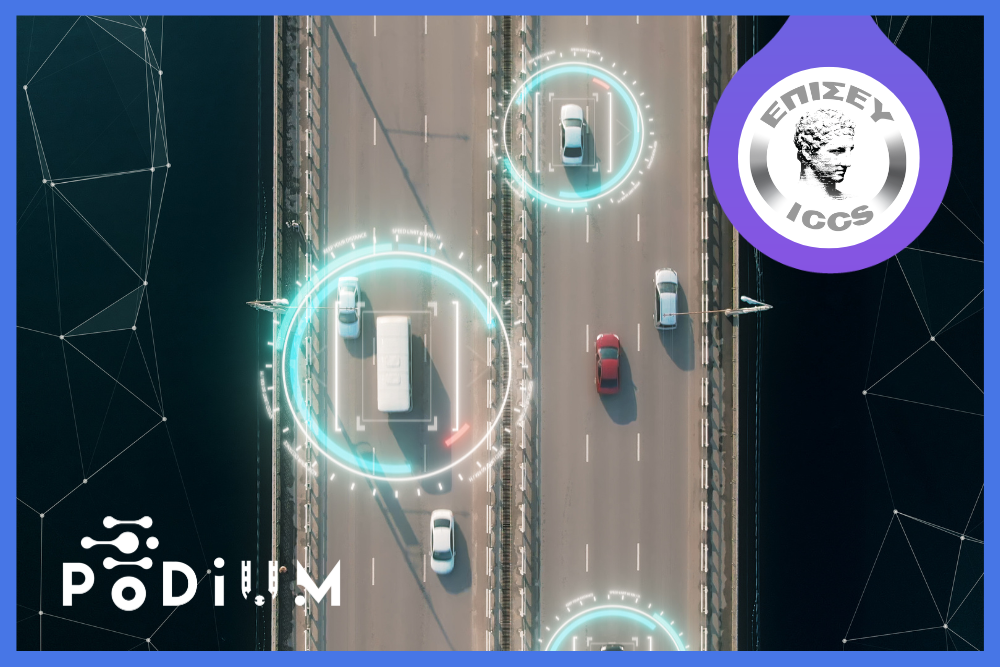Despite the numerous positive forecast analyses on CCAM deployment and market expectations, the commercial roll-out and adoption of CCAM in Europe is still hindered by the limited understanding of the potential benefits of connectivity and cooperation. In addition, software integrity and truthfulness of external data are critical prerequisites for the realisation of the CCAM vision, issues that have not been fully addressed yet.
PoDIUM will help with the uptake of CCAM in Europe by addressing those gaps with its planned PDI technology developments and its innovative CCAM use cases (UCs). The demonstration and validation of the PoDIUM approach will be performed in real-life conditions and will enhance the trust and acceptance of CCAM-enabled mobility by the public.
Leading the PoDIUM project
ICCS is the coordinator of the PoDIUM project, holding a great responsibility in helping a unique consortium to synchronise its efforts to achieve the best possible outcomes and create a real impact in the deployment and uptake of CCAM in Europe.
The PoDIUM consortium comprises 28 partners from 8 countries. The main strength of this consortium lies in the careful selection of all the relevant stakeholders of the CCAM ecosystem that have an inherent interest in progressing and materialising the CCAM vision. In particular, the selection of partners of complementary, multi-disciplinary scientific and operational expertise sets the base for successfully addressing all aspects of the project. PoDIUM involves major research organisations with extensive experience in national and EU CCAM projects, including vehicle manufacturers, tier-1 automotive suppliers, road and traffic management operators, network operators and vendors, highly expertised small and medium enterprises (SME) and local authorities. These partners have not only the expertise to deal with advanced technologies and CCAM services, but also the mandates for leading local and regional research and business development on this EU-priority topic.
In addition to its role as coordinator, ICCS is also responsible for the following tasks:
- Leader of Quality assurance and risk management (a.k.a. Quality Manager)
- Leader of public acceptance and impact assessment
- Leader of dissemination activities and events
- Participation in the definition of PoDIUM requirements
- Participation in the PoDIUM platform architecture definition.
ICCS, and in particular the ISENSE group, has an extensive expertise in the ITS and Smart Mobility sectors, gained by working on more than 120 EU-funded and national research projects along with several industry leaders. Through PoDIUM, ICCS as a research institute will exploit the knowledge and experience gained during the project in the field of automated driving and enhanced connectivity. Along with these areas, ICCS is expected to enrich its expertise, strengthen its network of collaborators and identify new research directions. Research proposals and future collaborations are expected to rely on i) the interaction with CCAM technology stakeholders, and ii) the PoDIUM technical achievements. Finally, the possibility of creating a technologically oriented spin-off will be pursued.
Advancing key PDI technologies
PoDIUM aims to support advanced UCs of connected and cooperative automated mobility in real traffic conditions. Building on the proposed urban and highway UCs in the facilities of 3 well-equipped Living Labs in Germany, Italy and Spain, PoDIUM will tackle all the different requirements for availability and performance of connectivity as well as the different cooperation enablers per UC. The proposed UCs aim to advance a set of key technologies both in the physical (i.e., MEC, wireless networking, RSUs, OBUs, VRUs, etc.) and the digital part of the infrastructure (i.e., Traffic Management Centre, Environmental perception, Digital Twins, C-ITS messages, Trust and Truthfulness, etc.).
In particular, the following list of contributions summarises the most important aspects of PoDIUM:
- A multi-connectivity approach to ensure reliability, availability and redundancy of the PDI system
- Advance data fusion and integration of Multi-access Edge Computing (MEC) to the proposed hybrid data management environment to enable enhanced environment perception models towards digital twins
- C-ITS messages extensions for enabling the specific advanced CCAM use cases
- Ensure software integrity, trust and truthfulness of CCAM data, their exchange and their processing
- Demonstration of urban and highway use cases in a diverse set of configurations with integration of Vulnerable Road Users (VRU).
Increasing road safety and traffic efficiency
ICCS envisions that the PoDIUM PDI developments will eventually increase road safety and traffic efficiency; at the same time, they will reduce the environmental impact of vehicles.
To achieve this, PoDIUM will provide real-time traffic data to road users and coming from vehicles, RSUs and VRUs. Emergency services are a major focus of PoDIUM with a dedicated use case, namely UC2, ‘PDI for User-Centric, CCAM-enabled Traffic Management in Urban Corridors with High Priority Vehicles and VRUs’.
The main target is to make all participants aware of the presence of the emergency vehicle, and to prioritise its movement across the traffic by sharing and synchronising the manoeuvres of the involved CAVs. Several scenarios will be considered with the emergency vehicle getting priority at signalised crossings, and the infrastructure informing the rest of road users that an emergency vehicle is approaching. In this context, the infrastructure will also detect the presence of VRUs, will evaluate the potential risks, and will provide the necessary notifications.
PoDIUM envisions (re)creating in real-time a detailed digital twin of the physical world based on advanced environment perception models and based on the seamless and efficient exchange of data (in low latency) among all the involved entities.
PoDIUM will improve traffic flows by exposing advanced real-time traffic data to the CAVs and the rest of the vehicles. This information will enable vehicles to use alternative paths based on the collected accurate data, thus optimising road utilisation and avoiding the creation of bottlenecks. An alternative way of improving traffic flow is by reducing traffic volume; a trend in highly automated driving is to lower vehicle ownership and introduce shared mobility models. PoDIUM is developing a commuting service where an automated shuttle transports road users from a mobility hub on one side of the borders to a mobility hub on the other side.

